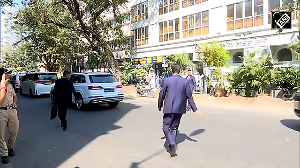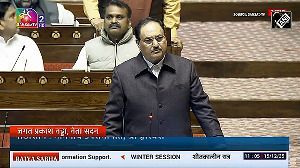India and United States are set to sign a breakthrough agreement on sharing classified military research data, according to sources on both sides.
The Master Information Exchange Agreement would mark the beginning of a new phase that would be far reaching in bilateral defence relations, officials involved in negotiations said.
According to indications the US side has hinted that the agreement would have to be signed by the defence minister or the defence secretary.
"The agreement provides a framework for exchange of classified research data in defence and thus opens a door shut till now in the bilateral front," a US official told rediff.com.
He said the agreement would take the present bilateral military relations, 'largely limited to joint exercises, high level visits and some military purchases' to a new plane where 'military scientists from both sides could be carrying out research in areas of common interest'.
Both sides have 'largely agreed up on' most parts of the agreement during the Indo-US Joint Technical Group (research and development) meeting in New Delhi from November 11 to 13 attended by senior scientists of Defence Research and Development Organisation and their American counterparts, he said.
The Joint Technical Group (research and development) is one of the three arms of the Indo-US Defence Policy Group co-chaired by defence secretary and his counterpart in the Pentagon.
The other two groups are the Military Cooperation Group (military exercises and exchanges) and Security Cooperation Group (sales and licensing). Besides, the three services have Executive Steering Groups for working out detailed joint plans.
Once the agreement is signed, it would allow defence labs in India and US to exchange scientists and collaborate in research.
The immediate fallout of the agreement would be that several Indian scientists would get to visit US military research facilities 'more than ever in the past', an Indian official said.
Also, there are areas in military research 'other than offensive weapons and systems' that the two sides would work on together. Research in offensive systems would be limited not only by internal compulsions but also by a strong Pakistani response.
During the Joint Technical Group in New Delhi scientists from the two sides conducted a workshop on enhancing human performance in varying military environments. The application of life sciences in military is only a 'take off point' for future joint researches in military between India and US, said an Indian official.
Enhancement of human performance in various environments is an area where Indian military scientists have made several breakthroughs. Their research in treatment of high altitude problems, especially since the Siachen conflict broke out in late 80s, is viewed as path breaking by scientists around the world.
It is already clear that the Americans are keen to learn lessons on high altitude warfare, counter-terrorism and jungle warfare from India. Most of the joint military exercises too have been focussing on these three areas. Joint research in these areas is 'only a natural corollary', the Indian official said.





